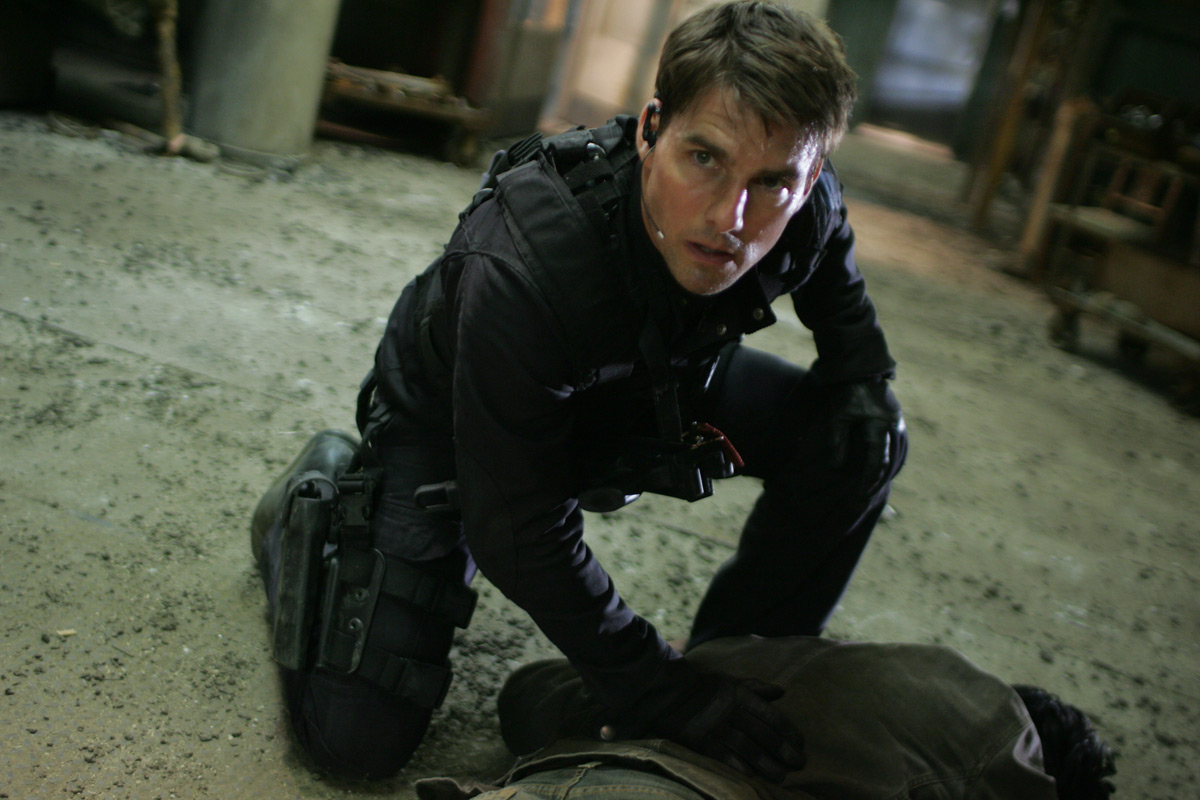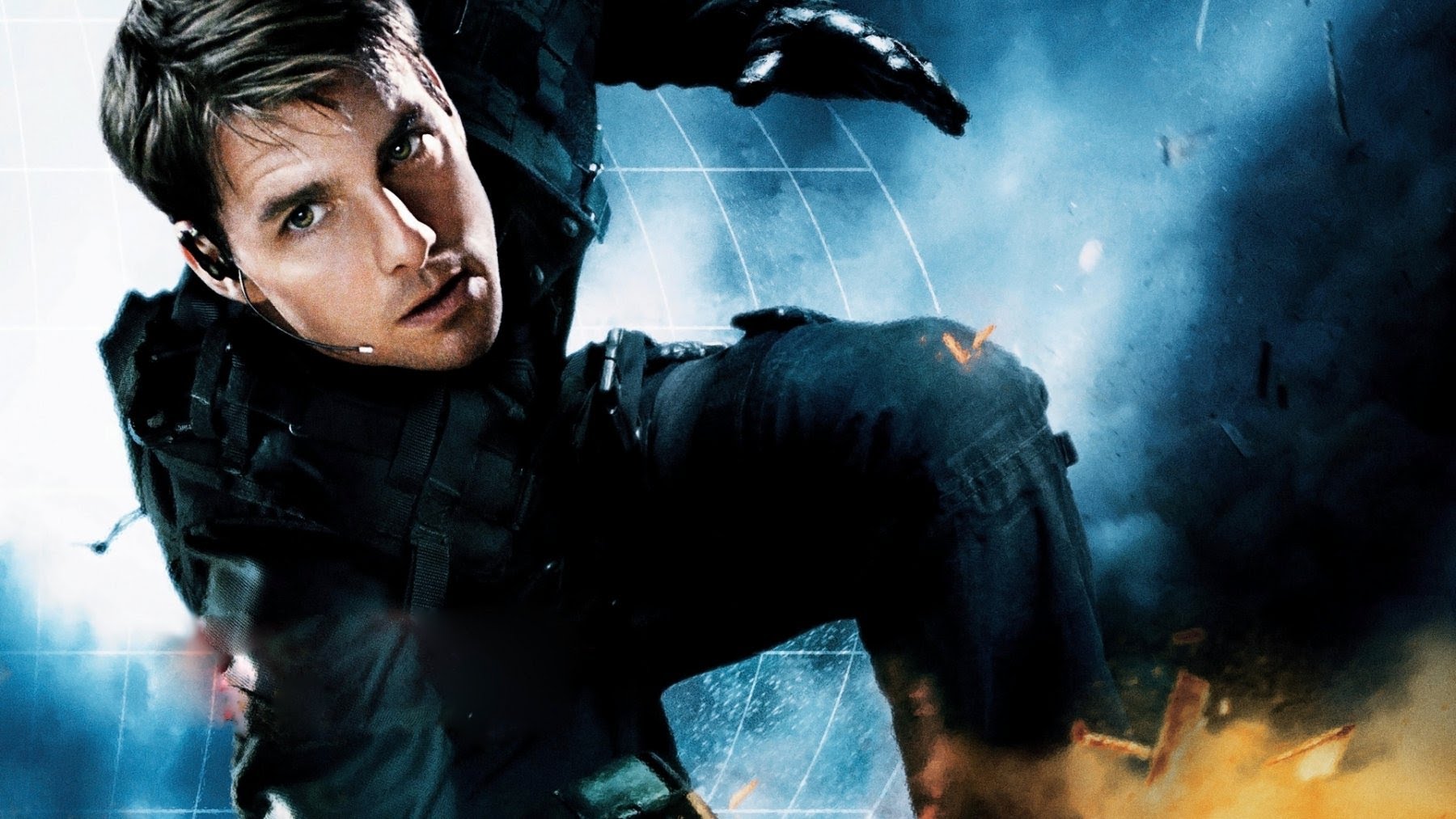Every day this week we will recap each film of the Mission: Impossible franchise, leading up to our review of “Mission: Impossible – Rogue Nation”. Your mission (should you choose to accept it) is to sit back and enjoy as we look back at nearly 20 years of the Mission: Impossible film series!
And if you missed any other entries, you can start here:
Day One: Mission: Impossible (1996)
Day Two: Mission: Impossible II (2000)
Today, we look back at…
MISSION: IMPOSSIBLE III (2006)
Which one was this again?
The best one since the first one. Ethan now trains IMF agents and has settled into a “normal” life with his fiance, Julia (Michelle Monaghan). After reluctantly getting involved in the mission to capture mysterious arms smuggler, Owen Davian (Philip Seymour Hoffman), Ethan’s worst fears are realized when Davian (who has connections inside the IMF) finds out about Julia and, after escaping Ethan’s custody, kidnaps her.
Best scene:
The first three minutes of the film. In true Alias fashion, director JJ Abrams gives us Ethan Hunt, stripped down, trapped and helpless. He’s strapped to a chair. A tiny little explosive has been put into his head that will kill him if Owen Davian chooses to press a small button. And Davian has Julia at gunpoint. He wants to know where “The Rabbit’s Foot” is. All we know is that Hunt gave it to him already and doesn’t know why Davian is asking where it is. Davian is stone-faced and cold as he announces that he’ll count slowly to ten. If Hunt doesn’t tell him where it is, Julia will die. Is he bluffing? No. Davian doesn’t care about anything but himself and his money. Here, we see Hunt doing everything he can to appeal to Davian. At first, he keeps his cool and tries to bargain — but as the count increases, Ethan is reduced to begging and pleading, his voice cracking and his eyes welling up with tears. The scene immediately grabs you and pulls you into this movie — and it’s even more exciting once you realize that it’s not actually the beginning of the story. We still have to find out how Hunt got there.
Best line:
Luther Stickell: Was there something more going on between you two?
Ethan Hunt: Lindsey was like my little sister.
Luther Stickell: And you never…slept with your little sister, right?
Actual best line:
Brassel: Mr. Musgrave, please don’t interrupt me when I’m asking rhetorical questions!
Personal recollections:
I really liked this movie. When it was announced, Tom Cruise was going through a shit-storm of unimaginable proportions and, in all honesty, the crap he was getting was warranted. His behavior was getting bizarre and he made no secret of his belief and ties to Scientology. I really thought this film would sink. After seeing the trailer, I was impressed — but still not completely sold. I liked what JJ Abrams had done with Lost and Alias. And, hell, it was Mission: Impossible. What wasn’t to like about it? I went to a midnight showing with my friends after one of my final retail shifts and was pleasantly surprised by how good the movie was. It was intense, fun and inspired. We still got black ops go-in-and-smoke-’em-out attitude of the last film — but returning was the covert missions where everyone played a part and blended in with the background. The score was also back to basics with Abrams’ preferred composer, Michael Giacchino, jumping on board to give us the bongo-and-horns spy ambiance. Also of note was the humanizing of characters. Hunt was no longer an unkillable super-spy. He was vulnerable. He could be hurt bad, both emotionally and physically. This was a welcome development. The movie would go on to gross around $400 million worldwide which, I guess, was apparently lower than expected — but it also turned a profit, so it wasn’t a total loss. The movie got positive marks from critics but more than a few made their disgust with Cruise known. This was a nice return to form after the out-of-character slam-bang action flick that was the last movie.
Other interesting things you might not have known:
- Early production on the film saw Ang Lee and Phil Alden Robinson as possible directors. The Lee treatment would have been a prequel to the first film in the series and would have also seen the return of Emilio Estevez as Jack Harmon. Director David Fincher was slated to direct this at one point but dropped out of both this film and Lords of Dogtown, the latter of which he stayed on to produce. Fincher stated, “I think the problem with third movies is the people who are financing them are experts on how they should be made and what they should be. At that point, when you own a franchise like that, you want to get rid of any extraneous opinions.” Joe Carnahan was signed after this because Cruise loved his film, Narc, but Carnahan left, citing severe creative differences just a month before shooting. His departure delayed the film for over a year as Cruise was contractually-obligated to shoot War of the Worlds with Steven Spielberg and JJ Abrams (who was eventually hired) was busy with Lost and Alias.
- This was JJ Abrams’ first feature film and the budget he had ($150 million) was, at the time, the largest ever afforded to a first-time director.
- Emil Richards was one of the five men playing the bongos on the film’s score. He was the person who played the bongos on the original Mission: Impossible series’ theme song.
- Thandie Newton was offered the chance to reprise the role of Nyah from the previous film, but declined to spend time with family. Carrie-Ann Moss was cast to replace her (in a new role) but her character was scrapped altogether after Carnahan left the project. Scarlett Johansson was also cast in the role of Lindsay Farris but dropped out and was replaced by Keri Russell. Kenneth Branagh was also a notable drop-out. Cast as a villain in the film, he left the project because of scheduling conflicts. When the dust settled and the actual cast was finally locked in, the budget was readjusted and Tom Cruise ended up taking a huge pay cut.
- The three female leads in this film (Keri Russell, Michelle Monaghan, and Maggie Q) have all, at one time, voiced Wonder Woman in various DCU Animated projects.
- This was the first Paramount Pictures release to have a digital print.





